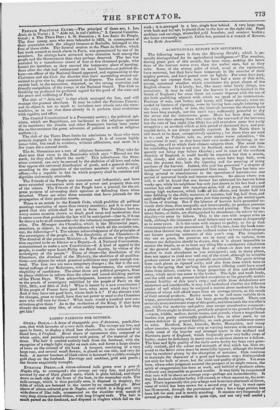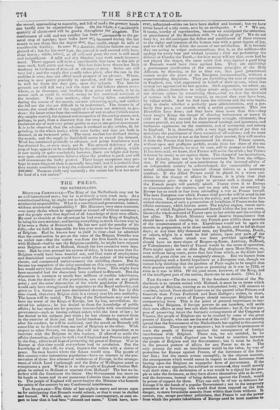AGRICULTURAL REPORT FOR SEPTEMBER.
The following report is from the Morning Herald ; which is ge- nerally distinguished for its agricultural intelligence.—" The weather, during great part of this mouth, has been rainy, making the latter days of the harvest worse even than the earlier ones, bad as they were. Some of the strong gales of wind, usual at the equinoxes, have occurred, but they have been temperate in the exercise of their mighty powers, and have passed over us lightly. For some days past, although not exempt from rain, we have had a taste of that mild, serene, autumnal weather which constitutes the great charm of the- English climate. It is lovely, but, like many other lovely things, to& transitory. It may be said that the harvest is nearly finished in the South of England ; for even there we cannot dispense with the use of the little qualifying adjunct with which we speak of its termination. Portions of oats, and barley, and beans, still linger abroad ; some re- tarded by lateness of ripening, some by having been caught loitering by the rain , since which, of late, the intervals between the showers have not been long enough, nor the sun's rays sufficiently powerful to dry the straw and the interwoven grass. Much has been done within the last two days among those who were in the rearward of the harvest; but the rain of last night (the 28th) has still overtaken some few tartly stragglers ; an accident which at this period of shortened days, and pro- tracted dews, is not always speedily repaired. In the North there is still much to be done, comparatively speaking ; but there they are used to it ; and, as Voltaire tells us, even under worse calamities, On s'accoutume de tout,' so they have their own modes of obviating, or en- during, the evil to which their climate subjects them. The usual time for concluding harvest is not over in Scotland, many of their oats fre- quently not being ripe before October ; and in some of the northern districts of England, it could hardly be expected but that a season, cold, cloudy, and rainy, as the present, must have kept back, even unto the present day, both the ripening and the securing of many portions of the harvest. Indeed, this year has presented " a chapter of accidents" more varied and contrasted than usual. There has been no- thing general or simultaneous in the operations of harvest—no one period of universal bustle and intense exertion. Go almost where you will, it will be found that one farmer has celebrated his harvest home weeks ago, while his neighbour has only just drawn in his last load ; and another has still some few vexatious acres, full of grass, and situated among high enclosures, which baffle all his efforts, and 'hinder half his time dabbling in the chilly moisture of autumn, half fog, half frost, and only Shaking off the morning dews just time enough to get wetted again by those of evening.. But if the labours of harvest have proceeded to. wards their close, thus unequally and interruptedly, its produce presents a piece of chequer-work still more intricate and puzzling. The crops in many farms, or fields, are distinguished by abundance—in others by me- diocrity—in some by failure. This is the case with respect even ta bulk, although the instances of total failure may not occur so frequently- as in some years. It is the same with respect to quality, as far as that' circumstance can yet be ascertained. It will be seen, from the loos % state- ment thus thrown out, that we are inclined rather to lower than advance our former guessing estimates of this year's crop. The irregulari. ties are so great, the premises are so many and so various, from whence our deduction should be drawn, that it is almost impossible to master the details, so as to form any thing like a satisfactory calculation of the general result. Speaking first of wheat—it does not come to market in such abundance as was anticipated ; and, in many places, does not appear to yield over well out of the straw, although its acreable produce cannot as yet be very generally ascertained. The grain arising from such pieces as ripened early, and also from those which were sa thin in the spring that nothing but profuse tillering could have saved them from failure, contains a large proportion of thin and shrivelled corns, which never can come to the bushel. The light and weak lands, and the cold and wet, present decided exceptions to the generally antici- cipated fertility of this year's crop ; and while those defalcations are numerous and considerable, it may well be doubted whether the different grades of soil which may be assigned a station above mediocrity in the culture of wheat will afford more than an average return, as the result of their several products. Barley seems to be still more variable than wheat, notwithstanding what has been generally reported. There are' certai illy many exuberant crops of this grain, and those catch the traveller's' eye, while the moderate and paltry ones escape unnoticed or unremem- bered. There might be districts, peculiarly adapted to the growth of barley —warm, friable, mellow, fertile hums, and gravels, where a magnificent burden.was pretty universally produced ; but, in other parts, by no means deficient in general fertility, no such general exuberance seems to exist. Hertford, Kent, Lincoln, Berks, Hampshire, and many other counties, represent their crop as varying between wide extremes ; while some of the heavier and stronger tracts in the midland and Northern parts of England, which frequently grow very bulky crops of barley, states its deficiency in many cases to amount almost to a failure. The lean and light quality of the early-sown barley has been very gene- rally noticed, _and the colour and strength of that which has been ex- posed to thelatter rains must be materially injured, although the kernel may be.rendered plump by the absorption of moisture. Oats continue to maintain the character of a good and bundant crop ; distinguished not only for bulk of straw, but for yield and quality of grain. Yet even here, where sober judgment assured the prospect of an ample return, the spirit of exaggeration has been at work, and babbled of products extra- ordinary and impossible as general results. It may fairly be conjectured that oats will be above an average crop—perhaps not inconsiderably. It may be doubted whether barley will exceed, or wheat amount to, the aver- age. There isgenerally this year a large and luxuriant aftermath of clover, some isf which has been mown for a second crop of hay, in most cases but ill-secured, through the prevalence of rain ; but a large portion has been left for seed, and is mostly standing. It consists very frequently of several growths; the earliest is quite ripe, and not very well seeded ; the second, approaching to maturity, and full of .seed the greenerlaeads can hardly now be expected to ripen. On the whole, a e',erisiderable quantity Of eletrer-ned will be grown throughout the 'iheedom. The continuance of cold and Wet weather has been. "7ataVeurahle to the ge- neral crop of turnips; their bulbs have no:4, increased duringthe last month in any thing like the degree that they ought, except in soils of considerable fertility. In some fe*.e distritia, absolute failures are com- plained of ; but for the most Iran, the ground is well covered with luxu- riant leaves ; while, at all cold and poor, the root is still small and insignificant. A mild and dry October may work much improve- ment. There appears still to be a considerable heaviness in the sale of store stock, both cattle and sheep. The late fairs have shown but little tendency to briskness of demand or advance of price. Swine are still very low ; and the supply that usually takes place, after the run in the stubbles is over, does not afford much prospect of an advance. Wheat- sowing is now pretty generally in operation, and the seed has gone in well for these few days past, upon the uplands. The heavier grounds are still full wet ; and the state of the follows almost every- where, as to cleanness, and freedom from grass and weeds, is by no means such as could be wished, owing to the continual moisture of the weather. The corn markets, after having fallen considerably during the course of the month, are now advancing again, and neither the fall nor the rise are difficult to be nuderstood, The former is, of course, the usual effect of the supply of a harvest not deficient in pro_ duce ; the latter arises from the continuance of wet weather (which makes dry samples scarce), the demand and occupation of the sowing season, and, perhaps, in part, from a discovery that our crop is not likely to be so exuberant nor of such very prime quality as was at one period announced. It is to be observed, that the advance is confined to dry articles, fit for grinding, in the wheat trade; while even barley and oats are both in demand, at an increased price. The meat market has declined during the month, and the supply in Smithfield seems to exceed the demand. Wool has continued gradually to advance, and prime Southdown wool has obtained Is., or even more, per lb. The general deficiency of the crop of hops appears to be confirmed by the operation of picking, which is now nearly or quite concluded ; however, there are bright and fortu- nate spots amidst numerous failures where the produce is good, and will well remunerate the lucky grower. These happy exceptions may per- Imps be more frequent than is generally imagined, and it is probable that they mainly contribute to keep the estimated duty at its present rate of 109,000/. Potatoes yield very variously; the season has been too moist for land of a wet nature."



























 Previous page
Previous page